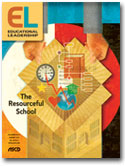What do your students' parents want for their children? How do they feel about your school? How do they feel about you? These are important questions, and unless we work to find the answers, we won't know what parents are thinking. Worse, unless we work to find the answers, we won't know that we don't know. We'll assume that everyone thinks the same way we do, and that's a recipe for trouble! It's important to regularly ask parents what they are thinking.
This year, I tried something new. At the beginning of our September open houses (we have three of them), each student's parent or guardian received a 3 × 5 card. After my welcome and presentation and before they left to go to their children's classrooms for the remainder of the evening, I asked the parents to answer the following questions on their card: "What do you want for your child from our school? What's the one thing you want us to teach your child?"
The open houses set the tone for the school year. It's a time when faculty members can set out their expectations and display their expertise, but it should also be a time to begin a dialogue that will continue all year. Sometimes, despite our rhetoric about partnering with parents, our actions demonstrate that we're really not all that interested in listening.
Was your open house an evening of parents sitting scrunched up tightly in children's desks and listening as teachers lectured? If yours is a secondary school, did parents trek from one classroom to the next, hearing 10-minute snippets from teacher after teacher? How much of an opportunity was there for parents to ask questions?
Then, after the open house, what happened? Was there regular communication between the teachers and parents? Does each class or teacher send home a weekly update that invites questions? How often does your faculty reach out to families about what is and what will be happening in the classroom? What about you? Does a weekly message come from the principal's office? When was the last time you shared some aspect of your education philosophy?
When does your faculty ask students' families to share their goals for their children? One of the traditions at my school is an intake conference. Held the third week of school—intentionally too early for us to have much knowledge about our students—this is a time when we listen and parents talk. My rule of thumb is that parents should talk 75 percent of the time. I offer possible questions to help parents think about issues that they may want to share. (How does your child handle frustration? Do you and your child talk about issues of human diversity? What's your scholastic goal for your child this year?) Starting the year with this sort of input is a great way to understand the children and families that are part of your school and to begin to work together.
Finally, how often do you formally solicit input and feedback? At the end of the year, I ask parents to complete a survey to share their thoughts about school, the quality of their child's education, and how friendly and supportive I have been. The most recent end-of-year survey contained 17 agree/disagree questions and invited a narrative response for each item.
The surveys are anonymous, but my last question asked parents who wished to provide their names so that I could contact them with a follow-up question or explanation. More than a third of my students' parents responded, and I had quite a few discussions as a result of their comments.
This is a wonderful way to reach out and find out what parents are thinking even though, candidly, it's hard to be this vulnerable. Sometimes I hear things that bother me or hurt my feelings, and occasionally I hear something that I am absolutely and positively sure is wrong! Then I step back and wonder what caused this perception; whether it's right or not, I need to be aware of it and deal with it. (You can see a sample of the end-of-year parent survey at www.surveymonkey.com/s/Q7LH9JH.)
Throughout the year, I continually ask parents for input. In mid-September I asked parents for feedback on our open houses in my parent letter (also using a SurveyMonkey link). "How was your parent-teacher conference?" is a question I posed in November.
By the way, 249 of my students' parents, representing over a half of the student body, returned a 3 × 5 card after their open house. The single most important quality they identified as something they want for their child was "self-confidence," and it was noted on nearly 20 percent of the cards. I shared our parents' priorities with the faculty, and we talked about how to ensure that our students develop strong self-confidence, recognizing that it begins with strong academic achievement and that we need to help students know how to respond to frustration.
What about you? Time to survey your students' parents?
